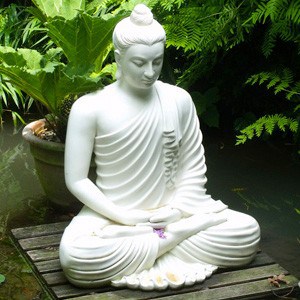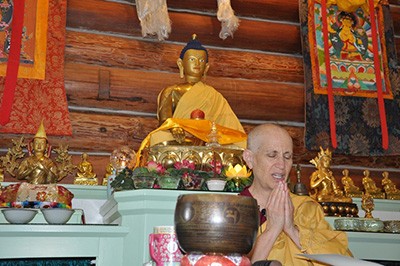Advice for a child with a chronic illness

A student writes in for advice on how to help a child with diabetes and her parents work with their emotions. Names of the student and the child have been changed.
Cindy’s letter
Dear Venerable Thubten Chodron,
I hope this message finds you in the best of health and that all of your many projects come to fruition as quickly as possible!
I am writing on behalf of my eleven-year-old friend, Sandi. I stayed with her family this past week. Sandi was diagnosed with Type-1 Diabetes about 18 months ago. This is a very difficult thing for the whole family, with her food being weighed out for every meal, calculations made and recorded for each thing she eats. She checks her own blood sugar levels four times per day, and injects herself in the abdomen with insulin four times per day. In spite of these careful calculations, she feels ill more days than not.
She is a very bright child, has done research on her disease, and understands the implications for her future. She has become angry, morose, and depressed (not continually, but with episodes almost every day).
Her parents asked for help with dealing with this from a Buddhist perspective. I’m sending out this notice to you, hoping for advice that I can collect and send on to her—as a child dealing with her own (understandable) anger, requesting any techniques for transforming anger and frustration. I’m going to make up a little packet of info to send to them.
Thanks so much, and may all beings benefit from your advice.
Cindy
Venerable Thubten Chodron’s response
Dear Cindy,
Here is a letter to send to Sandi. I wish her well.
Dear Sandi,
Your friend, Cindy, told me that you have diabetes. Just the fact that she wrote to her friends seeking resources to help you shows her care for you. Your parents and lots of other people care about you too. So although watching what you eat, having to have injections, and sometimes not feeling so great may seem to be a nuisance, you are not alone in this. Many other people care about you. If you went online, you may be able to contact other people your age who also have diabetes. That way you can support each other and learn from each other. You have a kind heart. You have a lot to offer others through your experience and that will help them. The more you reach out and share with others, the happier you’ll feel.
Whatever you feel about your health is fine. Sometimes you may feel sad, sometimes angry, sometimes happy. Accept all your emotions. Although you accept everything you feel, try not to get stuck in the emotions that make you feel bad. Instead remember all the other people who have illnesses and send love and compassion to them.
Here’s something you can try: Imagine a ball of light in the middle of your chest. It is the love and compassion you naturally feel for everyone. Let that ball of light shine and radiate light. Think that the light is your love—all the wishes you have for yourself and others to be well, peaceful, and happy. That light fills your whole body, so you feel very peaceful and content. Imagine the light healing your body too. Then the light, which is your love, radiates outside of you. It touches your parents, friends, neighbors, everyone around you. Imagine that it makes them peaceful too. Think that just as that light heals your body, it heals everyone who is sick. Then imagine the light goes out into the whole world and the universe, too, touching all the different beings, making them peaceful and well. Feel very happy that you can spread joy and peace in the world like this.
You can do this visualization whenever and wherever you like and for as long as you like.
Many of my teachers have diabetes, and their lives are meaningful and happy. They imagine like I described above. In fact, they were the ones who taught me how to do this, and I practice it too.
I send you lots of love,
Venerable Thubten Chodron
Venerable Thubten Chodron
Venerable Chodron emphasizes the practical application of Buddha’s teachings in our daily lives and is especially skilled at explaining them in ways easily understood and practiced by Westerners. She is well known for her warm, humorous, and lucid teachings. She was ordained as a Buddhist nun in 1977 by Kyabje Ling Rinpoche in Dharamsala, India, and in 1986 she received bhikshuni (full) ordination in Taiwan. Read her full bio.


